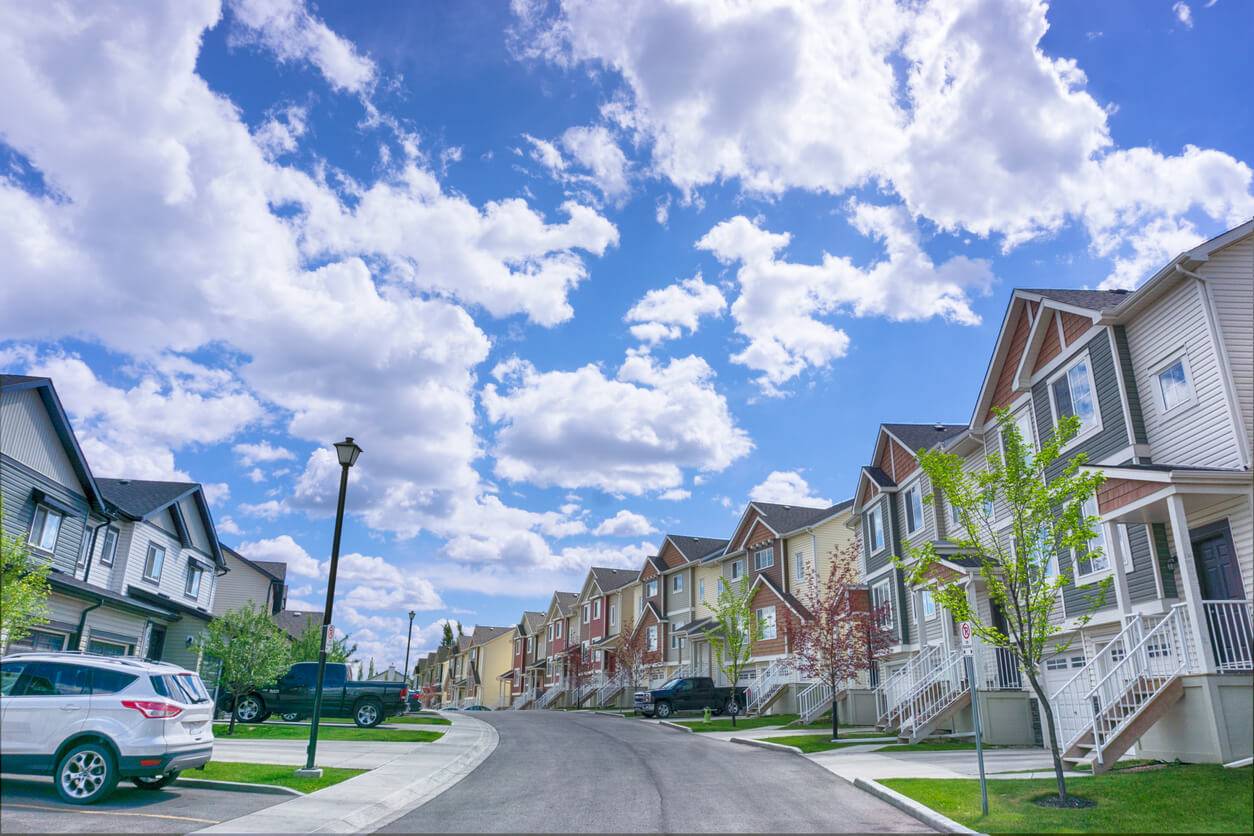Finding a home in Canada has proven to be harder than most could have ever imagined. The market has been competitive, especially in the major cities, for at least a decade.
But the pandemic brought on an entirely new level of fiercely competitive buyers. Since remote work became the new normal, people were willing to relocate not just to a new city, but to a new province. This drove up market prices in places there were relatively unchanging before 2020.
Table of contents
- The real estate market in Canada
- The real estate market in Calgary
- Low inventory is making for tight conditions
- Prices
Multiple interest rate hikes have cooled the Canadian housing market
Then, in 2022, there were a series of interest rate hikes. The Bank of Canada moved its key interest rate from 0.25% in February, to 4.25% in December. As a result, the average price of a home in Canada has dropped by more than $180,000 since hitting its peak in February.
By increasing interest rates, the Bank of Canada aims to reduce inflation. Higher interest rates make it harder for Canadians to secure larger mortgages and bring down spending. But it’s going to be a while before it reaches its target of 2%.
Until then, housing prices are expected to drop by up to 10% in 2023. But this doesn’t necessarily apply to every province, nor does it mean greater housing affordability for buyers. Homeowners will likely continue spending money, just on higher interest rates instead of home prices.
Calgary’s housing market may defy national trends
Calgary was one of those cities that experienced a surge in demand after the pandemic began. Today, sales activity remains above pre-pandemic levels in Alberta, and housing prices aren’t expected to drop significantly in 2023.
Experts predict that Calgary’s residential real estate market will continue to see growth while much of Canada drops off next year. Average sales could actually go up by as much as 12%, reports RE/MAX Canada.
So why is Calgary’s market still so hot? There are multiple reasons for the sustained demand.
The first reason is that Calgary’s housing affordability still remains among the best across Canada. The residential benchmark price has grown by 8.6% annually to $520,200 as of November 2022. That’s still quite reasonable to someone living in Toronto or Vancouver. Single-family homes in these cities are still more than $1 million.
Immigration is also on the rise. Over 33,000 international migrants settled down in Alberta between July and September of 2022. Affordability brings them to Calgary, but there is a long-term housing supply shortage that isn’t expected to clear up any time soon.
Low inventory is making for tight conditions
Inventory is expected to stay low in Q1 of 2023. There could be a steady increase during Q3, but numbers will slope down again in Q4.
A decline in sales, coupled with a pullback in new listings caused inventories to fall to their lowest level this past November since 2005.
The tightest conditions are occurring in lower priced developments. Supply growth has mostly been driven by gains in the upper end of the market.

Prices
The Calgary Real Estate Board (CREB) released statistics documenting sale prices of different types of homes.
Detached home sales slowed across every price range towards the end of 2022, contributing to a year-over-year decline of nearly 34%. Sales have slowed for homes priced under $500,000 as the level of new listings in this price range dropped by over 36%, limiting options for prospective buyers with smaller budgets.
New listings and supply selection did improve for more expensive properties, creating more balanced conditions for buyers who have more money to spend.
The benchmark price in November 2022 moved down from $648,500 in May to $619,700. While prices are not quite as high as the year comes to a close, they continue to remain nearly 11% higher than levels reported last year.
Semi-detached home sales have also slowed, but not by much. The pullback in November sales was enough to cause the year-to-date sales to ease by about 1% compared to last year. Nevertheless, year-to-date sales remain 37% above long-term averages for the city.
New listings were scarce as well, causing further declines in inventory levels. Unlike the detached home sector, semi-detached homes did not see price reductions at the end of the year. The benchmark price reached $562,800 in November, a number that was slightly higher than in October, and nearly 10% higher than last year’s levels.
Row home listings declined, and the sales-to-new-listings ratio remained very high at 99%. Inventory levels fell to 383 units, making it the lowest level of November inventory recorded since 2013. This low number contributed to weak row home sales.
Prices have trended down during November 2022, reaching $358,700. While they aren’t as high as they were during the middle of the year, they are still almost 14% more than prices reported last November.
Condominium sales are on the rise, even if new listings are not. This combination has caused greater tightening in market conditions as the sales-to-new-listings ratio pushed above 100%. Recent tightening in the market has put a pause on price adjustments for apartment condominiums. In November, prices remained relatively stable at $277,000 compared to the prior month. While prices have experienced a year-over-year gain of nearly 10%, they are still below their previous highs set in 2014.
General benchmark prices have increased in every part of Calgary, but the eastern and northeastern districts saw year-over-year increases of 13.6% and 14.9%, respectively. These districts have the least expensive housing, meaning it will be harder for buyers who have limited budgets to find something within their price range.
Conclusion
Purchasing a home in Calgary might still be an attractive option if you are currently in a big Canadian city. But those who already belong to the city and were hoping that prices would drop may be disappointed to learn that the opposite may be true for much of 2023.
The very low inventory rates coupled with a high interest in more affordable housing will continue to put a strain on much of the real estate market. Since interest rates are higher than they have been in a long time, prospective buyers aren’t able to borrow as much as they might have a couple of years ago.
The only other major Canadian market expected to see more growth than Calgary is Ottawa. Royal LePage has forecasted a 2% increase in that city’s aggregate, from $725,100 to $739,602. Average condo prices will increase 2% to $378,114, and average detached home prices will jump 1% to $850,117. Nevertheless, compared to other major cities in Canada, the market in Calgary is still quite reasonable.























